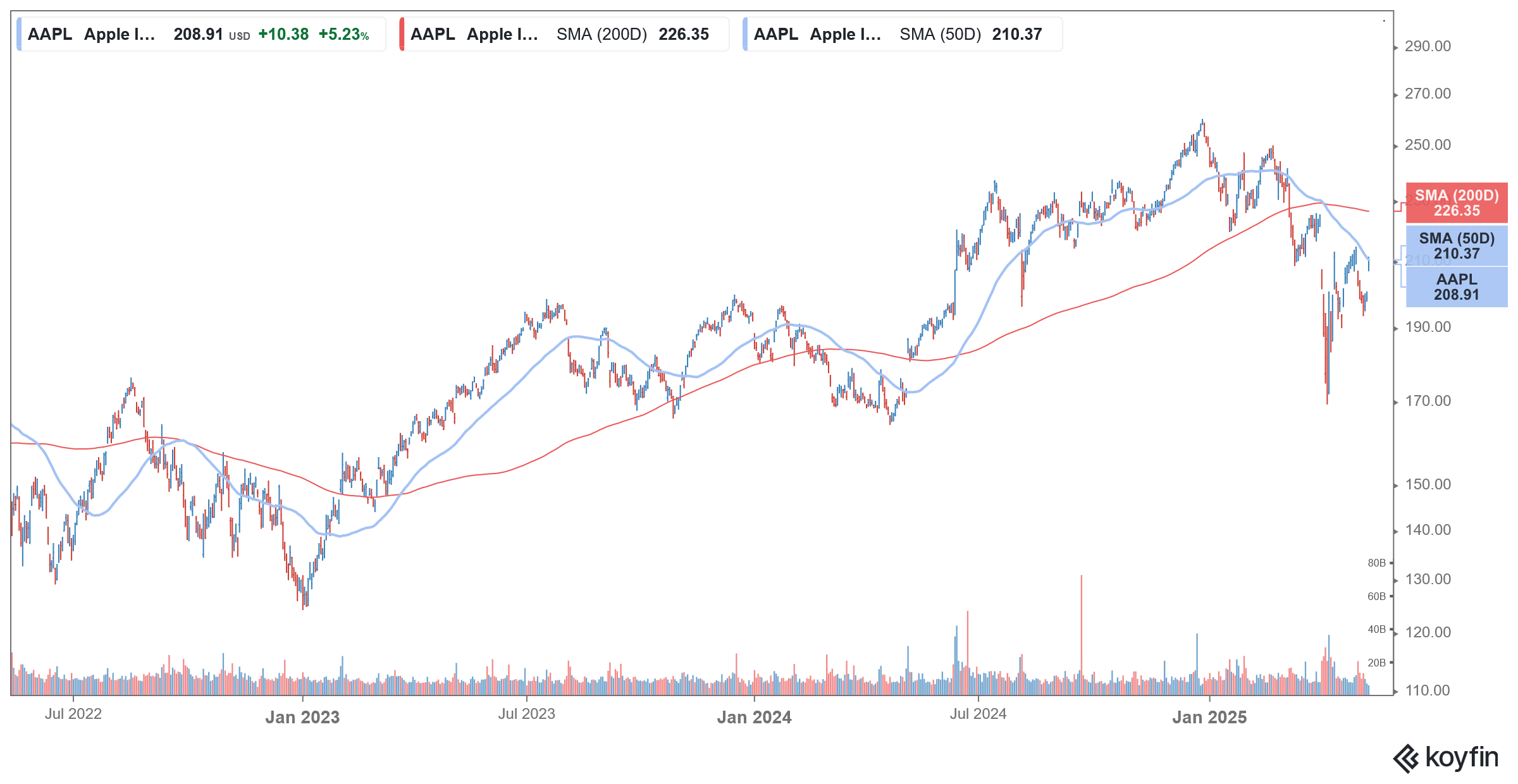Please note that we are not authorised to provide any investment advice. The content on this page is for information purposes only.
Apple (NYSE: AAPL) is reportedly considering raising iPhone prices to offset the impact of tariffs, but won’t explicitly say that the price hike is linked to tariffs. Amazon faced a backlash from the Trump administration after the company provided a breakdown of tariffs while increasing prices on its platform, and it seems Apple intends to avoid that controversy.
Apple finds itself in the crosshairs of the trade war. While President Trump exempted smartphone and tech products from the 125% reciprocal tariffs that he imposed on China, they are still subject to the 20% fentanyl-related tariffs that he previously announced. Moreover, after the trade talks over the weekend, both China and the US cut their respective reciprocal tariffs to 10%, which means that Chinese imports will attract a 30% duty in the US.
Apple Is Considering Raising iPhone Prices
According to a WSJ report, “Apple is weighing price increases for its fall iPhone lineup, a step it is seeking to couple with new features and design changes, according to people familiar with the matter.”
The report added, “The people familiar with the supply chain said Apple would have trouble making up for China tariff costs solely by seeking further savings from its suppliers, meaning a hit to its profit margin was likely unless it could raise prices.”
Meanwhile, the report says, “The company is determined to avoid any scenario in which it appears to attribute price increases to U.S. tariffs on goods from China, where most Apple devices are assembled, the people said.”
“These circumstances have led Apple to look at what supply-chain insiders described as the least-bad choice: raising prices on the new iPhones to preserve profit and finding reasons other than tariffs to explain the move. It couldn’t be determined what new features Apple may offer to help justify price increases,” added the report.
Amazon Dropped Plans to Break Down Tariffs Alongside Product Cost
Amazon, incidentally, faced a lot of blowback from the Trump administration amid reports of it providing a breakdown of tariffs along with product costs. According to reports, President Donald Trump himself called Amazon’s co-founder, Jeff Bezos, to express his displeasure.
Soon enough, Amazon came up with a clarification and said, “The team that runs our ultra low cost Amazon Haul store considered the idea of listing import charges on certain products.” The company spokesperson, however, categorically stated, “This was never approved and is not going to happen.”
Apple To Import Most of iPhones from India
During its fiscal Q2 2025 earnings call last month, Apple said that for US sales, it will source almost all of its iPhones from India and other products like Mac and iPads from Vietnam in the coming months. The company sidestepped the question on a potential price hike due to the tariff but warned of a hit of $900 million from tariffs in the current quarter.
Meanwhile, growing US-China tensions are also working to the detriment of US brands. China is increasingly becoming a tough market for foreign brands like Apple, General Motors, and Starbucks, and they have been losing market share to domestic Chinese companies.
Apple lost its position as the biggest smartphone seller in China last year and fell to the third spot as domestic Chinese rivals gained market share at the iPhone maker’s cost. Vivo was the top-selling brand in the world’s second-biggest economy last year, followed by Huawei, whose sales have surged over the last two years.
According to data from research firm Canalys, Apple’s shipments in China fell 17% YoY in 2024, which was the biggest annual decline for the Cupertino-based company. Moreover, its shipments fell in all four quarters, with the pace of decline widening to 25% in the fourth quarter.
Apple had a full-year market share of 15% in China last year, while Huawei and Vivo had 16% and 17% market share, respectively. Huawei has come up with competitively priced premium models and has grabbed significant market share from Apple.


AAPL’s Services Business Is Also Facing Heat
Separately, Apple’s Services business, which is the company’s most profitable segment, is also facing regulatory heat. A US federal judge ruled that Apple needs to allow competition in the App Store.
While Apple does not break down the revenues that it receives through the App Store fees, they are part of its hugely profitable Services business, whose gross margins are about twice that of the product business. The segment reported record revenues of $26.6 billion in the March quarter, which were up 12% YoY despite adverse currency movements. Notably, while in previous quarters, Apple used to provide some color on the segment’s revenue guidance, it refrained from doing so, citing “uncertainty from several quarters.”
Apple has warned of a hit of “hundreds of millions to billions” due to the proposed rules. Notably, Apple had to allow third-party app stores in the European Union under the region’s Digital Markets Act.
Apple Earns Billions of Dollars Through Its Partnership with Google
Apart from the dispute over the App Store fees, Apple is also facing the heat over its exclusive deal with Alphabet, wherein Google is the default search engine on iPhones. Apple earns around $20 billion annually as part of the deal, and regulators want Google to end such exclusive agreements.
Replying to a question about US Department of Justice’s case against Google, Tim Cook said during the Q2 earnings call, “that case is ongoing and I don’t really have anything to add beyond that. And so, we’re monitoring these closely. He, however admitted, “there’s risk associated with them and the outcome is unclear.”
Meanwhile, Apple stock is trading sharply higher today amid the broad-based rally in US markets. The tariff cut is far bigger than what markets were expecting, just as the “reciprocal tariffs” far exceeded what markets were expecting.
#Apple #Reportedly #Raising #iPhone #Prices #Tariff #Reprieve


